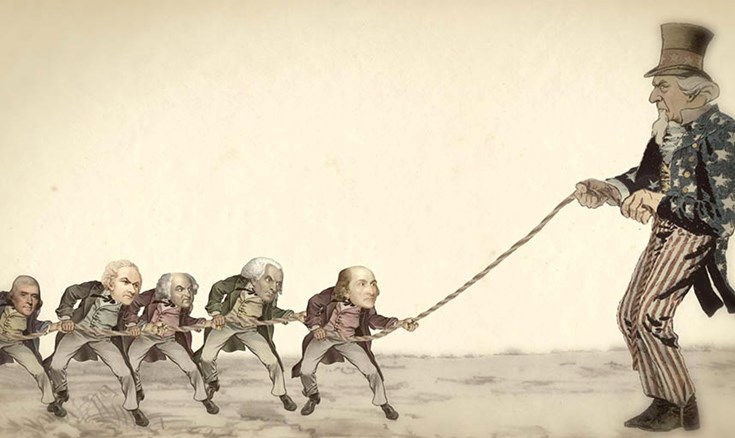Written by Hunter Haskins
Dr. Justin Garrison, assistant professor, and Dr. Bryan Parsons, associate professor, of the RC Public Affairs Department helmed the provocatively-named “Is Federalism Dead?” panel last week on Monday, Feb. 11. Hosted by the RC Public Affairs Society, this dialogue explored the ideas and quandaries posed by America’s time-honored federalist system of government.
“I agreed to participate in the event because the topic of federalism is prevalent in both my teaching and research. I teach courses on Public Policy, State and Local Government, and The Politics of Health Policy that all examine policymaking in the American federal system, and my recent research examines policy implementation in state and local education politics,” said Parsons.
Federalism sees the role of a broad national governmental institution counterbalanced by more concentrated, regional government entities like states or provinces. When functioning well, these two levels of government work collectively yet autonomously for the benefit of their constituents within established limits. Competing theories abound on the nature of federalism, such as the sovereignty of the smaller governments and the cooperability of the different administrative tiers, sometimes causing reason for strife and warranting scrutiny among both adherents and opponents of federalist principles.
“Most people support federal or state primacy in these and other areas largely because of their partisan policy desires. What we provided at the forum was non-partisan historical, practical, and philosophical tools to help students understand the broader implications of this particular constitutional structure. That might sound dry, but we are increasingly confronted with leaders at the state and national levels from both parties with less than full commitments to thinking about institutions and structures outside of narrow partisan considerations,” said Garrison.
The U.S. is no stranger to concerns over federalism, with deliberations over the authority of states commencing well before the signing of the Constitution. Nullification and other states rights issues played a significant role in national tensions prior to the Civil War, compounded by issues of slavery and state sovereignty. America has grappled with the political and social consequences of the federalist model throughout its history. One of the major questions in the talk explored why this system, which causes much happiness and heartburn to some 330 million Americans daily, sometimes seems to be fading away.
Ryan Denholm, freshman and president of Public Affairs Society, hoped attendees would take inspiration for discussion from the contemporary issues that were examined.
“Challenges to the system are becoming apparent, with states passing laws decriminalizing marijuana and… clerks refusing to issue marriage licenses,” said Denholm.
Following a ten minute address from each professor weighing in on the event’s titular question, both Parsons and Garrison took queries from the audience concerning federalism’s perks and shortcomings. Before ending the event, both professors encouraged the students to reach their own conclusions about the current state of U.S. federalism as it had been presented before them that afternoon.
“I really enjoyed the policy side of things that Dr. Garrison and Dr. Parsons talked about. I’m more policy-oriented, so I liked hearing them talk about how federalism has evolved and how it applies now to education policy, national security policy, and more. They both brought different things to the table, and it helped me to understand it better,” said sophomore Casey Wilson.
The Public Affairs Society looks forward to hosting future thought-provoking events on campus this semester. For those interested in learning more about the club, or wishing to help plan out similar engagements, contact Ryan Denholm (rgdenholm@mail.roanoke.edu) or Dr. Justin Garrison (garrison@roanoke.edu) for more information.




